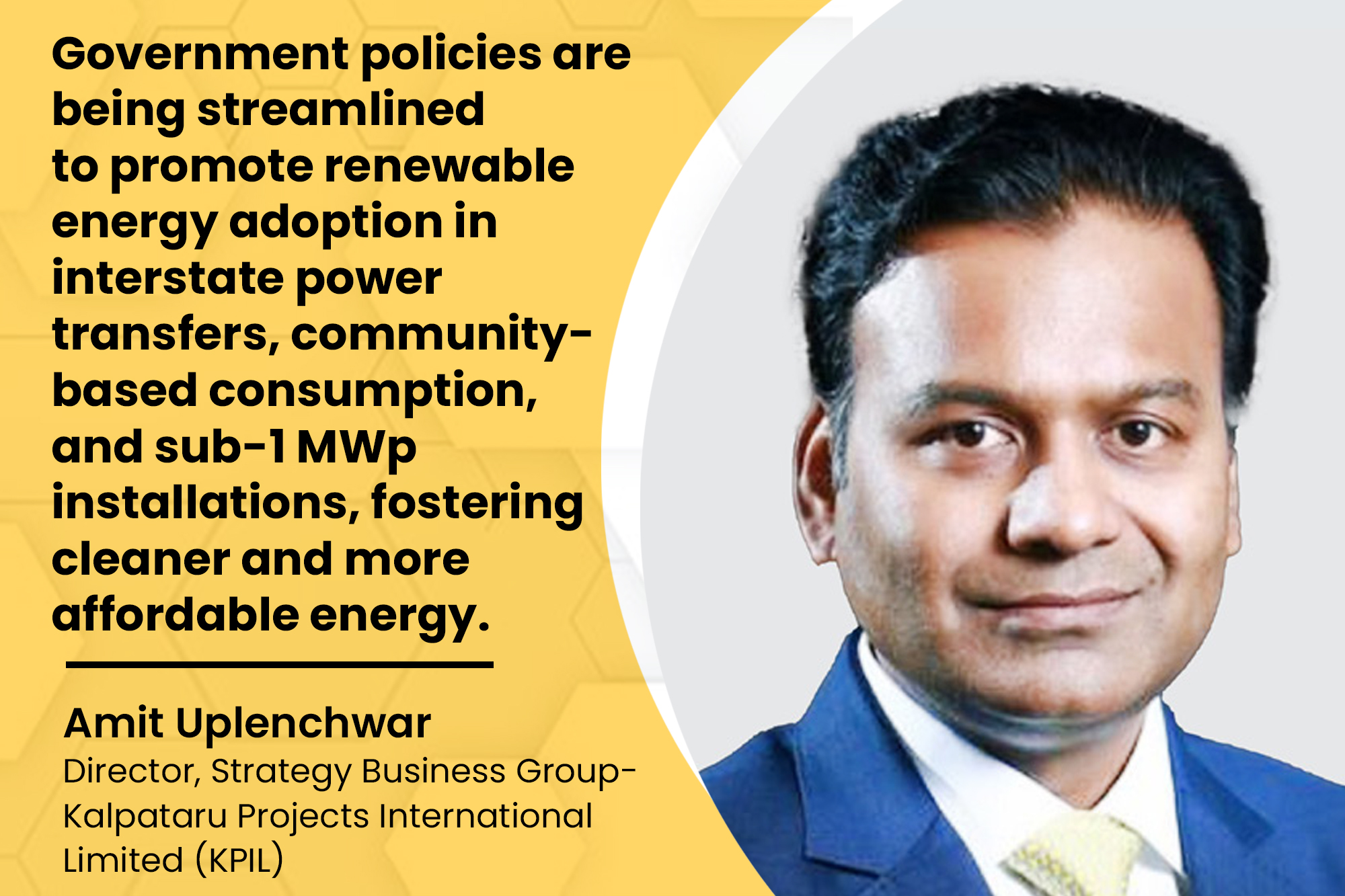KPIL is actively involved in initiatives to promote a cleaner, resilient and inclusive power landscape
By EPR Magazine Editorial January 3, 2024 4:23 pm IST
By EPR Magazine Editorial January 3, 2024 4:23 pm IST

Government policies are being streamlined to promote renewable energy adoption in interstate power transfers, community-based consumption, and sub-1 MWp installations, fostering cleaner and more affordable energy.
Smart grids are still in their early stages in India, but the potential is immense. By embracing new technologies, India can build a resilient and sustainable energy future where an uninterrupted power supply is a dream and a reality for all. Amit Uplenchwar comments on the emerging trends in the power sector while sharing his views with EPR Magazine.
How are government initiatives contributing to the transformative shift towards sustainability?
Government policies are being streamlined to promote renewable energy adoption in interstate power transfers, community-based consumption, and sub-1 MWp installations, fostering cleaner and more affordable energy. Reforms address investor confidence, tackle land acquisition hurdles, and incentivise rooftop solar. The focus on domestic manufacturing supports photovoltaic cells and wind equipment production. Emphasis on baseload technologies, such as offshore wind and nuclear power, ensures a stable and clean energy supply. The Green Hydrogen Mission targets a 5 MMTPA production capacity by 2030. Grid modernisation involves anti-theft measures, HVDC lines, and interstate line development, while ongoing construction of 19,869 km of interstate lines underscores commitment to network enhancement.
In what ways are smart grids being implemented and utilised?
India is at the forefront of a transformative energy landscape with smart grids. These grids hold immense potential for a resilient and sustainable future in their early stages. The vision entails a self-monitoring network with real-time responsiveness, utilising smart meters for data collection on consumption and network health. India is utilising narrow-band technologies like RF-2.4 GHz, ensuring reliable data transmission even in remote areas. Smart grids use tools like ‘peak shaving’ and dynamic pricing to address congestion from renewable energy adoption. The digital power of smart meters provides detailed consumption reports, empowering informed choices and reducing waste. India prioritises data security through multi-level systems, including the root of trust (RoT) and public key infrastructure (PKI).
Could you provide insights into public-private collaborations strengthening electrification?
The government actively encourages private sector involvement through initiatives like the Electricity (Amendment) Bill 2022 and the UT DISCOM privatisation project. Supporting regulatory frameworks and financial incentives like subsidies and rebates can further bolster private participation. Transmission and distribution, with only 7 percent and 6 percent private participation, present immense opportunities for improvement. Private DISCOMs, like those excelling in MoP’s ranking, showcase the efficacy of private participation in distribution. Replicating these models and scaling up best practices can transform the entire landscape.Implementing a market-coupling operator allows for a single, transparent price across exchanges, optimising resource allocation and ensuring efficiency. Introducing regulated energy derivative markets can mitigate risk and enhance flexibility for generators and consumers. Shorter credit lines further improve market liquidity. Exploring market-based models can optimise dispatch decisions, ensuring cost-effectiveness while preventing the complete displacement of PPAs. This strikes a balance between market dynamism and contract stability.
What steps are KPIL taking to ensure a cleaner, resilient, and inclusive power landscape?
Kalpataru Projects International Limited (KPIL) is actively involved in initiatives to promote a cleaner, resilient, and inclusive power landscape. As India’s largest listed EPC company, we significantly contribute to current renewable energy capacities while playing a pivotal role in adopting modern technologies. We invest in research and the creation of new solutions that emphasise energy storage, employing contemporary innovations such as smart grids to promote the adoption of energy conservation efforts and expand utility efficiency schemes. Sustainability, which forms the basis of KPIL’s ideology, minimises our impact on the environment and emphasises sustainable development strategies.
The company’s plan includes installing solar panels and using renewable energy instead of conventional sources. This strategic move aligns with our goal to increase the share of renewable energy, currently standing at an impressive 23.8 percent, reaching a significantly higher portion within the next three years.
Spokesperson: Amit Uplenchwar, Director, Strategy Business Group- Kalpataru Projects International Limited (KPIL)
We use cookies to personalize your experience. By continuing to visit this website you agree to our Terms & Conditions, Privacy Policy and Cookie Policy.